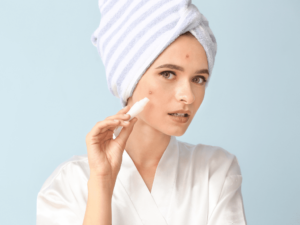Why does skin feel sensitive for pregnant women?
Pregnancy can be a time of heightened anxiety and, coupled with a new rush of hormones, the skin can become extra sensitive. In fact, some experts believe this is a woman’s way of protecting her body and baby from infection and disease. If your skin does feel much drier and sensitive, you should ensure that your skin care during pregnancy is soothing yet simple. Look for minimalist formulas that contain hydrating and gentle ingredients such as glycerine, shea butter and hyaluronic acid.
Why has my skin become oily?
During pregnancy you may find that you have extra sebum and oil in the skin, causing the pores to become clogged and even acne to breakout around the cheeks, chin and jawline. This hormonal change is due to the body creating more progesterone in order to help line the uterus. So, while you can rest assured the change is completely natural, there are some ways that you can help to keep your skin balanced. The best way of managing oiliness in the skin is with a cleanser and moisturiser designed to target blemishes and regulate sebum with gentle exfoliating ingredients such as AHAs (alpha-hydroxy acids). Try to avoid harsher ingredients like salicylic acid as they can increase sensitivity. You can also try using a clay or mud mask to gently clear the pores and keep on top of congestion.
How can I prevent melasma?
As the skin can become more sensitive during pregnancy, it also increases photosensitivity (its reaction to the sun’s UV rays). This stimulates the skin’s pigment hormones which can cause melasma – a skin condition characterised by patches of discolouration. Melasma, a condition where melanocytes create an increased amount of pigment for the skin, results from both photo exposure and oestrogen exposure. While not exclusive to pregnant women, the increased oestrogen production during pregnancy has led the condition to be nicknamed the ‘mask of pregnancy’.
While melasma often fades after pregnancy, it’s very important that you protect the skin on your face with broad-spectrum sun protection in a high SPF. Make sure you apply every morning as the last step in your pregnancy skin care routine. Treatment for melasma is focused on reducing ultraviolet exposure to the affected areas with broad spectrum sunscreen and additional use of lightening creams, such as hydroquinone. It is important to note that if the pigment is in the dermal (deeper) layer of the skin, as opposed to the superficial epidermis, then treatment is more difficult. A certified dermatologist is able to assist in making that distinction and recommending the proper treatment.
How can I help prevent pregnancy stretch marks?
Stretch marks are a natural part of pregnancy that appear as pinkish streaks across the hips, stomach and breasts. They occur as the skin stretches and the fibers beneath the surface break apart to accommodate your growing baby, especially towards the third trimester when weight gain increases. You can help to prevent and reduce the appearance of stretch marks by applying a rich moisturizer morning and evening to areas that marks are most likely to appear. Continue applying a moisturizer throughout your pregnancy, especially when stretch marks do start to appear, as they are easier to treat when they are new.
Which Skin Care Products Are Safe During Pregnancy?
Pregnancy is an exciting time, but it often comes with many skin care challenges. Most pregnant people wonder which skin care products are OK to use and which ones aren’t. Is salicylic acid during pregnancy OK? What about glycolic acid? Benzoyl peroxide for acne? Is retinol OK during pregnancy? The answers might surprise you!
First, it’s always important to check with your physician and discuss the specific skin care products you want to use. Happily, most skin care products such as cleansers, toners, moisturizers, eye creams, scrubs, and lip balms that don’t contain over-the-counter ingredients regulated by the United States FDA are fine for use throughout pregnancy. However, pregnancy skin care involving topical prescription products, certain over-the-counter skin care ingredients, and retinol are a different issue.

Using Skin Care Products During Pregnancy
Misinformation about pregnancy skin care creates frustration and confusion for pregnant people during a time they should be enjoying to the fullest. To get some much-needed clarification, we consulted the American College of Obstetricians and Gynecologists regarding the ingredients we’re asked about most. Here’s what they had to say:
- Benzoyl peroxide is an excellent ingredient to control acne and in low concentrations (5% or less), is considered the best acne treatment safe for pregnancy.
- Salicylic acid (BHA) is a superior exfoliant for skin, and the small percentages used in skin care are OK to use while pregnant. You can also consider using glycolic acid or lactic acid (AHA) exfoliants during your pregnancy. What about in-office AHA or BHA peels? AHA peels are preferred if the peel is to be applied over a large area of the body.
- Sunscreen actives are not known to be a risk during pregnancy. The American College of Obstetricians and Gynecologists hasn’t found any of the alleged fears about sunscreen ingredients substantiated by medical or animal research. Daily sunscreen use is strongly recommended by dermatologists. If you find your skin is more sensitive during pregnancy, consider using sunscreens with only the mineral actives of titanium dioxide and/or zinc oxide, as both are non-irritating. You can find all about sunscreen in our article Ultimate Sun Protection – Skincare with Sunscreen Tips.
- Hydroquinone has not been tested on animals or humans regarding its use during pregnancy, so it’s best to avoid using products that contain hydroquinone during pregnancy or while you’re breastfeeding. The same is true for the ingredient arbutin and derivatives such as alpha-arbutin because both break down to hydroquinone on skin. Instead, look to products that contain 5% or greater concentrations of niacinamide and various forms of vitamin C.
- Tranexamic acid is a newcomer to skin care that isn’t known to be a problem for topical use on skin with hyperpigmentation while pregnant; however, we don’t have enough data yet for it to be recommended without reservation. It’s another ingredient to discuss with your physician.
- Azelaic acid via topical prescription is considered safe for use during pregnancy and has good research showing it can improve brown skin discolorations plus help with breakouts and visible symptoms of rosacea.
- Anti-aging products with vitamin C, niacinamide, hyaluronic acid, and peptides are generally considered safe for use during pregnancy—there’s no research proving they’re a problem for topical use. But we repeat: If you’re uncertain about starting a new anti-aging product or a combination of ingredients, check with your physician and follow their advice.
- Avoid prescription retinoids (Renova, Retin-A, Differin, Tazorac, and generic tretinoin) and over-the-counter products with retinol due to its relation to prescription retinoids. Consider switching to an anti-aging serum that does not contain retinol or its derivatives (retinyl retinoate, retinaldehyde, or hydroxypinacolone retinoate).
- Prescriptions for other skin concerns: Your doctor will be able to advise you on which topical medications are suitable for use during pregnancy, how they should be used, and whether the benefits outweigh the risks (if any).

Note that we strongly recommend you share every skin care product (especially the prescription and over-the-counter drug products) you’re planning to use while pregnant with your physician and only proceed if they approve.
The information above isn’t meant to be exhaustive, but it should give you a clear idea of what’s OK to use during pregnancy and what should be avoided. We hope you’re feeling relieved that you can achieve your skin care goals during pregnancy! Do not hesitate to book an appointment with our specialists that will happily assist you in any skin concern you might have!





